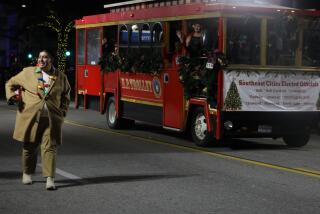BOOK REVIEW : Witty Study of a Corrupt Politician : THE RASCAL KING: The Life and Times of James Michael Curley (1874-1958), by Jack Beatty Addison-Wesley $25, 571 pages
- Share via
Bookstore browsers, hefting this biography, might wonder why they should read hundreds of pages about a crooked and comical Boston Irish politician (mayor, governor and member of Congress) who died in 1958 and hasn’t been causing much trouble lately. The reason is that Beatty’s book is a delight--rich, witty, flowing and full of insight about the nature of political corruption.
Despite the affectionate “rascal” in the title, Beatty doesn’t resort to the leprechaun syndrome; there’s no nonsense about mischievous little Irishmen. Curley was mean and disloyal and a liar. He had flair, he was witty and sometimes generous, but he was also brutal.
Beatty’s full portrait is a useful corrective to the raffish charm of the fictionalized Curley in Edwin O’Connor’s bestseller “The Last Hurrah,” and the benign Spencer Tracy portrayal in the movie version.
Curley had the distinction of having been in jail at both ends of his long career, and one has to marvel at his shamelessness and perseverance. At 70 he was elected mayor, at 71 he served six months in federal prison for fraud. He ran for office a total of 32 times--for City Council, state representative, alderman, Congress (five times), mayor (10 times), governor (three times) and U.S. Senate.
(A disclosure of my interest in Massachusetts politics. Curley was badly defeated in his Senate race by Henry Cabot Lodge Jr. Lodge’s next opponent was my father, Joseph Casey; he came much closer to winning. The Democrat who ran and won the next time was John F. Kennedy. My father appears in Beatty’s book twice; the references are brief and neutral.)
Beatty, whose father was the son of an Irish immigrant, shares Curley’s joy in language. The orotund voice, the hypnotically complex syntax and the apparent sincerity served Curley well in his 32 campaigns. Beatty’s tone, in bracing contrast to Curley’s, is wry and deflating.
Curley was not loyal to other politicians, even if they were Irish. He betrayed the Irish-Catholic presidential candidate Alfred E. Smith as well as President Franklin Roosevelt. At 39, Curley opposed the incumbent mayor, John F. Fitzgerald, President Kennedy’s maternal grandfather. A letter was delivered to Fitzgerald’s wife, describing a relationship between her husband and a cigarette girl known as Toodles. Curley announced he would soon be giving a series of lectures including “Great Lovers in History: From Cleopatra to Toodles.” Fitzgerald withdrew.
Curley went beyond amusing dirty tricks to true intimidation. Public Works Department employees who didn’t support Curley candidates in City Council races were dismissed. The high bidders kept getting city and state contracts, with much of the difference going to Mayor Curley.
For Curley, governing was not exactly a sacred trust. Government was about jobs, politics was about jobs. I have to vote for him, Bostonians often said, he got my father a job. Early in his career, as a leader in Boston’s Tammany Club, his goal was to do at least 50 favors a week. These favors included his first felony--trying to take a civil service exam for a friend. He served two months in jail, but turned it to his advantage.
To the Irish, the purpose of the civil service tests seemed to be to keep immigrants off the federal payroll. Beatty, a scrupulous researcher, checks the record to find what Curley didn’t mention: Sixty-nine percent of those on the civil service eligibility list were born in Ireland or were of Irish descent.
When his honesty was questioned, Curley said he was being persecuted because he was Irish, practicing politics as described by Henry Adams--”the systematic organization of hatreds.” “No country is ever ruined by a virile, intelligent, God-fearing, patriotic people like the Irish . . . “ Curley wrote. “What we need in this part of the world is men and mothers of men, not gabbing spinsters and dog-raising matrons. . . .” The implication being that the reform-minded elite on Beacon Hill were not full-blooded human beings and preferred dogs to children.
As governor, Curley turned into a real despot. “There is only one political party in the commonwealth at the present time,” he said, “and that’s the governor.” His worst hour came at the height of the Depression, when he delayed federal relief projects to give work to his favored contractors, the ones who gave him kickbacks. Lies about money landed him in prison again at 71.
What is appealing about Mayor Curley is that he knew the value of a grand gesture. One of his first edicts as mayor was to get the scrubwomen in the State House long-handled mops, to get them off their knees. One of these women, passing by his coffin, recalled: “It was him who did away with calling us scrubwomen, getting us called matrons and cleaners and putting us on the civil service.”
Beatty’s biography is a lesson in how to keep a nonfiction narrative moving. His book has the drive that can only come when a writer is completely in command of the material, and in a way enthralled and appalled by it. He alerts readers to the danger of thinking that those obviously rascally politicians in the past were less honest than politicians are today. Curley liked to think of himself as the Robin Hood mayor.
When a reporter called him a thief, which was quite true, Curley replied: “I never took a quarter from anyone who couldn’t afford it.” Which was nearly true.
More to Read
Sign up for our Book Club newsletter
Get the latest news, events and more from the Los Angeles Times Book Club, and help us get L.A. reading and talking.
You may occasionally receive promotional content from the Los Angeles Times.










